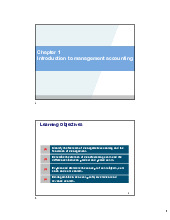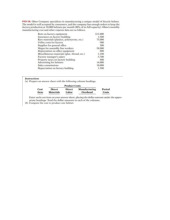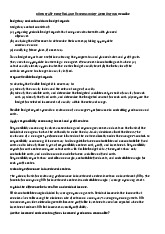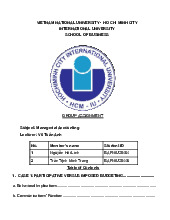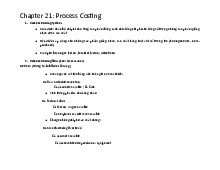








Preview text:
lOMoAR cPSD| 58605085
Vietnam National University – HCMC International University
SCHOOL OF BUSINESS ADMINISTRATION COURSE SYLLABUS* BA010IU Managerial Accounting Semester II, 2019-2020
Note: The outline with specific venue and time, and updated learning
materials for the current semester will be provided to the enrolled students by the lecturer lOMoAR cPSD| 58605085 BA010IU
VNU – International University Managerial Accounting School of Business 1. COURSE STAFF
Lecturer: Mr. Vu Tuan Anh, CMA, MSA. Room: TBA E-mail: anhtv@hcmiu.edu.vn Consultation hours: TBA Teaching Assistant: 2. COURSE INFORMATION
2.1 Teaching times and Locations Time Room TBA TBA 2.2 Units of Credit
This course is worth 3 credits.
2.3 Parallel teaching in the course
There is no parallel teaching involved in this course.
2.4 Relationship of this course to others
BA010IU– Managerial Accounting focuses on cost control and cost management in
organizations. It builds on, and extends the materials taught in–Financial Accounting.
2.5 Approach to learning and teaching
Employing the interactive learning and problem-based teaching approach, this course
emphasizes the interaction between lecturers and students. The lecture materials will be
uploaded in Blackboard to help the students to preview the materials and to concentrate on
listening and critical thinking during the lecture. This will help students to interact with the
lecturer during the classroom. The sessions for presentations and discussions comprise
company case studies as well as answering some theoretical and conceptual questions,
which help the students to see how the concepts are applied in the real international
business context. Students will present the case to the class and discuss with the peers.
3. COURSE AIMS AND OUTCOMES 3.1 Course Aims
This course emphasizes the use of accounting information for internal planning and control
purposes. It is designed to provide students conceptual and practical skills and techniques
to perform business evaluation to assist managers in making sound judgments and lOMoAR cPSD| 58605085 BA010IU
VNU – International University Managerial Accounting School of Business
decisions. Identified are the budgetary process and related performance evaluation
techniques, cost-volume-profit relationship, product costing methods, and some other
relevant theories and applications.
3.2 Student Learning Outcomes
Upon successful completion of this course you should be able to:
- Analyze and explain key managerial accounting concepts and principles.
- Analyze and record business transactions common to the manufacture of inventory in: • Job order costing systems • Process costing systems
- Prepare accrual basis financial statements for manufacturers.
- Explain common cost classifications and apply cost behavior concepts using costvolume-profit analysis.
- Explain the budgeting process and prepare a variety of budgets.
- Explain and apply the concepts underlying standard costing systems, including the analysis of variances.
- Explain decentralization and apply related performance measurement concepts.
- Identify relevant costs and prepare analyses of costs and benefits considered in operational decisions.
- Explain the capital budgeting process and apply a variety of methods used to make such decisions.
- Use accounting information to make management decisions.
3.2 Teaching Strategies
The learning system in this course consists of lectures and scheduled
presentations/discussions. Lectures elaborate the appropriate theoretical content in the
textbook and readings. Classes provide a more detailed and refined analysis of both
concepts and applied materials. Classes are strongly oriented towards interactive discussion
of the text and cases. In order to gain the most from the lectures and class activities, the
assigned text/reading should be read before the lecture to participate in the discussions.
4. STUDENT RESPONSIBILITIES AND CONDUCT 4.1 Workload
It is expected that the students will spend at least six hours per week studying this course.
This time should be made up of reading, research, working on exercises and problems, and
attending classes. In periods where they need to complete assignments or prepare for
examinations, the workload may be greater. lOMoAR cPSD| 58605085 BA010IU
VNU – International University Managerial Accounting School of Business
Over-commitment has been a cause of failure for many students. They should take the
required workload into account when planning how to balance study with part-time jobs and other activities.
4.2 General Conduct and Behavior
The students are expected to conduct themselves with consideration and respect for the
needs of the fellow students and teaching staff. Conduct which unduly disrupts or interferes
with a class, such as ringing or talking on mobile phones, is not acceptable and students
will be asked to leave the class. More information on student conduct is available at the university webpage. 4.3 Keeping informed
The students should take note of all announcements made in lectures or on the course’s
Blackboard. From time to time, the university will send important announcements to their
university e-mail addresses without providing a paper copy. The students will be deemed
to have received this information. 5. LEARNING ASSESSMENT
5.1 Formal Requirements
In order to pass this course, the students must:
• Achieve a composite mark of at least 50; and
• Make a satisfactory attempt at all assessment tasks (see below). 5.1 Assessment Details
Participation & Assignment 30% Mid-Term Exam Final Exam 30% 40% Total 100% Assessment Rationale
Quiz & Homework: Student is required do homework on every class date. Two quizzes
will be conducted in this class (one before midterm and one after midterm) with advanced
notice, and those will be part of participation & assessment.
Examination: Mid-term and final tests will be a combination of MCQ, short answer
questions, and application problems.
Programmable calculators will not be allowed for use during the exam. The use of
programmable calculator will result in receiving a zero for the exam. lOMoAR cPSD| 58605085 BA010IU
VNU – International University Managerial Accounting School of Business
The examination schedule and room will be announced by the Office of Academic Affair.
Any issues regarding the administration of, timetabling of and non-attendance at final
examinations need to be directed to the Office of Academic Affair. These issues are not
the responsibility of the individual lecturer.
Others: Students will not be allowed to attend the final exam if result of either homework
or mid-term exam is zero mark.
5.4 Class participation
University regulations indicate that if students attend less than eighty (80%) per cent of
scheduled classes they may be refused final assessment. Exemptions may only be made on
medical grounds. Students will be assessed on the basis of quizzes.
5.5 Special Consideration
Request for special consideration (for final examination only) must be made to the Office
of Academic Affairs within one week after the examination. General policy and
information on special consideration can be found at the Office of Academic Affairs. lOMoAR cPSD| 58605085 BA010IU
VNU – International University Managerial Accounting School of Business
6. ACADEMIC HONESTY AND PLAGIARISM
Plagiarism is the presentation of the thoughts or work of another as one’s own (definition
proposed by the University of Newcastle). Students are also reminded that careful time
management is an important part of study and one of the identified causes of plagiarism is
poor time management. Students should allow sufficient time for research, drafting, and
the proper referencing of sources in preparing all assessment items. The university regards
plagiarism as a form of academic misconduct, and has very strict rules regarding plagiarism. 7. STUDENT RESOURCES 7.1 Course Resources
Please note that it is very important to gain familiarity with the subject matter in the
readings and cases prior to attendance in classes.
Textbook: Accounting Principles IFRS Version, Global Edition, by: Jerry J. Weygandt;
Paul D. Kimmel; Donald E. Kieso Reference Books:
Ronald Hilton, and David Platt, Managerial Accounting – Creating Value in a Dynamic
Business Environment, 10th edition.
Additional materials provided in Blackboard
The lecturer will attempt to make lecture notes and additional reading available on
Blackboard. However this is not an automatic entitlement for students doing this subject.
Note that this is not a distance learning course, and you are expected to attend lectures and
take notes. This way, you will get the additional benefit of class interaction and demonstration.
Recommended Readings & Internet sites Business Week Forbes The Wall Street Journal The Journal of Accountancy
7.2 Other Resources, Support and Information
Additional learning assistance is available for students in this course and will be made
available in Blackboard. Academic journal articles are available through connections via
the VNU - Central Library. Recommended articles will be duly informed to the students. lOMoAR cPSD| 58605085 BA010IU
VNU – International University Managerial Accounting School of Business 8. COURSE SCHEDULE
The following is the outline that sets topics for the course. The instructor reserves the right
to revise this outline throughout the semester to either add or delete material as necessary
to accomplish the goals of the course. WEEK TOPICS CONTENTS Textbook,
Lecture 1: Managerial Accounting Chapter 19 1 Managerial accounting basics Managerial Cost concepts
Manufacturer Financial Statements Managerial Accounting Trends
Lecture 2: Job Order Costing Textbook, Chapter 20 Cost Accounting Systems
Job Costs Sheets and Manufacturing Costs 2 Predetermined Overhead Rates
Completed and Sold Manufacturing and Service Jobs
Applied Manufacturing Overhead Textbook,
Lecture 3: Process Costing Chapter 21 3
Overview of Process Cost Systems Recording Costs Equivalent Units The Production Cost Report
Lecture 4: Cost-Volume-Profit Textbook, Chapter 22 Cost Behavior Analysis Mixed Costs Analysis 4 Cost-Volume-Profit Analysis Break-Even Analysis
Target Net Income and Margin of Safety Textbook,
Lecture 5: Budgetary Planning Chapter 24 5
Effective Budgeting and Master Budget
Sales, Production, and Direct Materials Budgets
Lecture 5: Budgetary Planning Textbook
Direct Labor, Manufacturing Overhead, and S&A Expense Budgets Chapter 24 6
Cash Budget and Budgeted Statement of Financial Position
Budgeting in Non-Manufacturing Companies 7 Big Quiz 1 lOMoAR cPSD| 58605085 BA010IU
VNU – International University Managerial Accounting School of Business 8 REVIEW 9 MIDTERM Textbook,
Lecture 6: Budgetary Control and Responsibility Accounting Chapter 25 10
Budgetary Control and Static Budget Reports Flexible Budget Reports Text book,
Lecture 6: Budgetary Control and Responsibility Accounting Chapter 25 11
Responsibility Accounting and Responsibility Centers Investment Centers and ROI Text book,
Lecture 7: Standard Costs and Balanced Scorecard Chapter 26 12 Standard Costs Direct Materials Variances Text book,
Lecture 7: Standard Costs and Balanced Scorecard Chapter 26 13
Direct Labor and Manufacturing Overhead Variances
Variance Reports and Balanced Scorecards
Lecture 8: Incremental Analysis Text book, Chapter 23
Decision-making and Incremental Analysis 14 Special Orders Make or Buy Text book,
Lecture 8: Incremental Analysis Chapter 23 15 Sell or Process Further
Repair, Retain, or Replace Equipment
Eliminate Unprofitable Segment or Product Text book,
Lecture 9: Planning for Capital Investments Chapter 27 16
Capital Budgeting and Cash Payback
Net present value method, IRR, ARR
Capital Budgeting Challenges and Refinements 17 Big Quiz 2 18 Review 19 Final
*The syllabus is prepared following the format provided by the School of Organisation and Management, University of
New South Wales, with kind permission.
